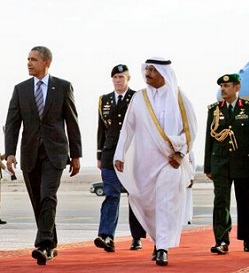President Obama traveled to Riyadh today to meet with King Abdullah seeking a “rapprochement with an aggrieved Arab ally whose interests are increasingly at odds with its key western backer.” Initial reports from the bilateral discussions largely focus on mending U.S. and Saudi disagreements over Syria and Iran. Notably lacking from the conversation is any mention of the crisis in Bahrain, which requires proactive U.S. and Saudi engagement to solve.
As two of Bahrain’s most powerful allies, the United States and Saudi Arabia have a unique responsibility to prevent a further deterioration in the country. Yet their relationship with the Bahraini government has done little to elicit the enactment of meaningful reforms needed to preempt that. Indeed, the Saudi government often works in contradiction of that goal through its bolstering of hardliners in the ruling family, and was directly involved in the suppression of the 2011 protests when it oversaw the incursion of Saudi-led Gulf Cooperation Council forces into Bahrain to crackdown on protesters.
Much like its approach to Saudi Arabia, the U.S. government often refrains from publicly criticizing the Bahraini government, despite well-documented and systematic human rights abuses. While backdoor diplomacy is appropriate under certain circumstances, the absence of strong public statements in the face of blatant human rights abuses is extremely problematic and can be viewed as tacit approval of such actions. Just this week, Reporters Without Borders reported on the jailing of Ahmed Humaidan, a well-known press photographer who was jailed for 10 years “in connection with an alleged attack” at a police station, despite the fact that he was there “just to take photos of the use of violence by the security forces.”
In the lead up to the visit, Representative Hank Johnson (D-GA), joined by four other members of Congress, sent a letter to the President asking him to raise the crisis in Bahrain during his meetings in Riyadh, stating that:
“The people of Bahrain have made it clear that their demands for legitimate and meaningful reform will not be suppressed. The recent efforts by the Crown Prince and opposition political parties in Bahrain to revitalize the failed National Dialogue process must be given the space to succeed. Failure to address the legitimate aspirations of the Bahraini people could have significant effects on the stability of the region and the long-term security interests of the United States. This includes the viability of the continued presence of the U.S. Fifth Fleet and Central Command.”
The stakes in Bahrain are high. Both the United States and Saudi Arabia must play a constructive role in encouraging the Bahraini government to swiftly implement the meaningful reforms necessary to reach a negotiated solution to the country’s current crisis.
–
Diala Jadallah is Director of Advocacy at ADHRB
Please click here for a PDF of this blog post.





